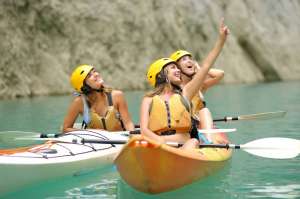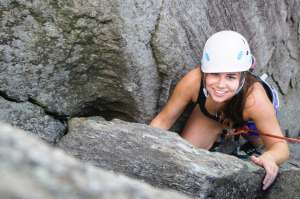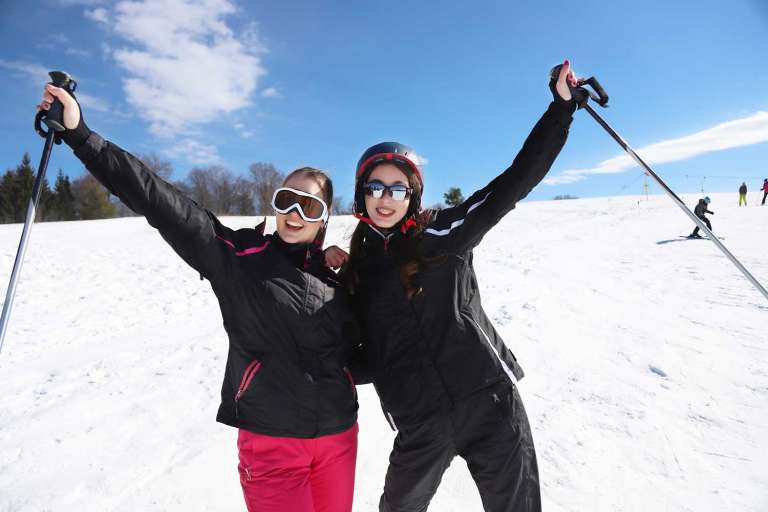Recreation Therapy Program
 All forms of recreation can be therapeutic. General recreation can increase self-esteem, encourage and strengthen social connections, and alleviate anxiety. These benefits come naturally, even when the recreation is primarily for enjoyment. Recreation therapy takes these benefits further, utilizing recreation as a therapeutic intervention. This includes assessing what a participant needs, creating goals and objectives for those needs, planning and experiencing an activity that will meet those goals and objectives, and processing it all with the participant. At Cascade Academy, students engage in both forms of recreation.
All forms of recreation can be therapeutic. General recreation can increase self-esteem, encourage and strengthen social connections, and alleviate anxiety. These benefits come naturally, even when the recreation is primarily for enjoyment. Recreation therapy takes these benefits further, utilizing recreation as a therapeutic intervention. This includes assessing what a participant needs, creating goals and objectives for those needs, planning and experiencing an activity that will meet those goals and objectives, and processing it all with the participant. At Cascade Academy, students engage in both forms of recreation.
Your child will participate in a Recreation Therapy program designed specifically for those who suffer with severe anxiety. They will meet regularly with the Recreation Therapists to ensure that the treatment is specific to their needs. This program includes leisure education “clubs” and therapy “sequences”. The clubs are year-round and based on interest and season. The sequences are 8-week long evidence-based Recreation Therapy interventions, leading up to and a “capstone experience”. During the capstone experience, students will have the opportunity to practice their learned skills in a novel environment with novel challenges and celebrate their increased self-confidence. After each capstone experience, each student will receive a metal medallion as a reminder of their accomplishments in that sequence.
 Self-Efficacy is a student’s belief or confidence in their abilities. Each “sequence” focuses on the clinical outcome of increased self-efficacy in the students involved, while also bringing to light a therapeutic theme that students can experience and discuss. With an increase in general self-efficacy, research points to a reduction in associated symptoms of anxiety and depression. Research also suggests that outdoor/adventure activities build self-efficacy with an intensity that many other activities do not have.
Self-Efficacy is a student’s belief or confidence in their abilities. Each “sequence” focuses on the clinical outcome of increased self-efficacy in the students involved, while also bringing to light a therapeutic theme that students can experience and discuss. With an increase in general self-efficacy, research points to a reduction in associated symptoms of anxiety and depression. Research also suggests that outdoor/adventure activities build self-efficacy with an intensity that many other activities do not have.
Along with processing individually with students, one tool that Cascade Academy uses to measure success in recreation therapy is the Generalized Self-Efficacy Scale (GSE) (Schwarzer, R., & Jerusalem, M., 1995). This scale measures the changes in general self-efficacy of our students. Along with other clinical assessments, students complete the GSE monthly.
Exposure Response Prevention (ERP) is the primary treatment modality used for the treatment of anxiety and OCD. Students are exposed to activities and situations that make them anxious or trigger their obsessions. If a student is fearful of heights, rock climbing will be approached by gradually “exposing” them to heights. The repetitious exposure rewires the neuropathways in the brain which slows down or dissipates the anxiety response.
Through Recreation Therapy your child will improve their ability to function physically, emotionally, mentally, and spiritually. Therapy done in an experiential way is learned and processed differently, and on a deeper level. Through leisure education, your child will learn a variety of skills, be gently pushed out of their comfort zone, and have opportunities to practice these skills with support and guidance.
Recreation Therapy sequences may include:
- Rock Climbing
- Canyoneering/Rappelling
- Water Activities
- Cross-Country Skiing
- Downhill Skiing & Snowboarding
- Mountain Biking
- Horseback Riding
- Service
Recreation Therapy themes may include:
- How success is defined
- Mindfulness
- Balance
- Acceptance and Commitment
- Flow
- Authenticity
- Relationships
- Resilience
- Self-Acceptance
- Service
- Play
- Courage
- Coping
- Passions


